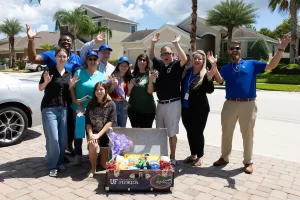Let’s talk about children. Last month my one-month old granddaughter was admitted for pneumonia. She was diagnosed with RSV.
What is RSV? Respiratory syncytial virus, or RSV is a common respiratory viral illness. . Normally it causes mild cold like symptoms and almost all will recover within one week. Most children will have been exposed by the age of five. However very young children especial those under 2 can become very ill. It is the most common reason for inflammation of the small airways of the lungs in children under one year of age.
Symptoms of RSV include runny nose, decrease in appetite, coughing, sneezing, fever, and wheezing. These symptoms appear in stages and not all at once. In the very young the only symptoms may be irritability, decreased activity, and breathing problems. When severe it can cause inflammation of the small airways and pneumonia.
Infants and young children with RSV infection may have runny noses and a decrease in appetite before any other symptoms appear. Cough usually develops one to three days later. Soon after the cough develops, sneezing, fever, and wheezing may occur. In very young infants, irritability, decreased activity, and apnea may be the only symptoms of infection.
Most otherwise healthy infants and young children who are infected with RSV do not need hospitalization. One to two out of every 100 children younger than 6 months of age with RSV infection may need to be hospitalized. Those who are hospitalized may require oxygen, intubation, and/or mechanical ventilation. Most improve with supportive care and are discharged in a few days
How is RSV Transmitted? RSV can spread when an infected person coughs or sneezes. You can get infected if you get droplets from the cough or sneeze in your eyes, nose, or mouth, or if you touch a surface that has the virus on it, like a doorknob, and then touch your face before washing your hands. Additionally, it can spread through direct contact with the virus, like kissing the face of a child with RSV.
People infected with RSV are usually contagious for 3 to 8 days. However, some infants, and people with weakened immune systems, can continue to spread the virus even after they stop showing symptoms, for as long as 4 weeks. Children are often exposed to and infected with RSV outside the home, such as in school or child-care centers. They can then transmit the virus to other members of the family.
Respiratory syncytial virus can also cause more severe infections such as bronchiolitis, an inflammation of the small airways in the lung, and pneumonia, an infection of the lungs. It is the most common cause of bronchiolitis and pneumonia in children younger than 1 year of age.
Almost all children will have had an RSV infection by their second birthday. People infected with RSV usually show symptoms within 4 to 6 days after getting infected.
Prevention
RSV season occurs each year in most regions of the U.S. during fall, winter, and spring. If you have contact with an infant or young child, especially those who were born prematurely, are very young, have chronic lung or heart disease or a weakened immune system, you should take extra care to keep the infant healthy by doing the following:
- Wash your hands often
Wash your hands often with soap and water for 20 seconds, and help young children do the same. If soap and water are not available, use an alcohol-based hand sanitizer. Washing your hands will help protect you from germs. - Keep your hands off your face
Avoid touching your eyes, nose, and mouth with unwashed hands. Germs spread this way. - Avoid close contact with sick
people
Avoid close contact, such as kissing, and sharing cups or eating utensils with people who have cold-like symptoms. - Cover your coughs and sneezes
Cover your mouth and nose with a tissue or your upper shirt sleeve when coughing or sneezing. Throw the tissue in the trash afterward. - Clean and disinfect surfaces
Clean and disinfect surfaces and objects that people frequently touch, such as toys and doorknobs. When people infected with RSV touch surfaces and objects, they can leave behind germs. Also, when they cough or sneeze, droplets containing germs can land on surfaces and objects. - Stay home when you are sick
If possible, stay home from work, school, and public areas when you are sick. This will help protect others from catching your illness.
If you think your child has RSV see your pediatrician. There are test that can be performed. Not all clinics can test for RSV. So, call and check with your pediatrician or go to ER if your child is very ill. There is no specific treatment for RSV infection.


